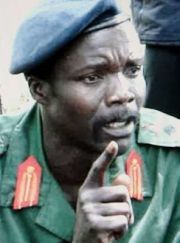Ugandan rebel leader postpones peace deal signing
April 1, 2008 (KAMPALA) — The leader of Uganda’s Lord’s Resistance Army rebels, Joseph Kony, has postponed signing a peace deal this week to end one of Africa’s longest wars because he is sick, a source involved in the talks said on Tuesday.

President Yoweri Museveni was to sign the document in South Sudan’s capital Juba two days later.
A spokesman for the government peace team Chris Magezi said Kony had indicated he needed more time to reach the Ri-Kwangba assembly point from his base several miles away in east Democratic Republic of the Congo.
Earlier, Magezi and a source involved in the talks said Kony was sick.
LRA representatives were not immediately available for a comment.
“The information we have now is that Kony’s not sick but still walking to Ri-Kwangba,” Magezi said. “He has proposed that April 10th be a new date when he will sign.”
Magezi said that the government would wait for the mediator to reset a date for Museveni’s signing. “It’s a setback but not enough to undo what we have achieved,” he said.
Despite progress at talks after months of deadlock, many Ugandans remain sceptical that Kony would emerge out of the bush to sign the deal for fear of arrest over an International Criminal Court (ICC) indictment for war crimes.
A source involved in the negotiations said of the delay: “It is very frustrating but in the end it’s a matter for the two parties to sort out.”
Some government officials have accused the LRA of using the talks to rearm. The two-decade conflict has killed tens of thousands and displaced nearly 2 million.
Kony and two of his senior deputies are wanted by the Hague-based ICC for multiple war crimes including rape, murder and the abduction of children.
Fearing arrest, they have never appeared at the Juba talks.
A section of the peace deal on justice for war crimes outlines ways in which Uganda will try to deal with rebel atrocities internally, using a mixture of traditional tribal justice and Uganda’s own courts of law.
As well as signing the deal, Uganda must set up a special division of the High Court to deal with war crimes. The government plans to approach the ICC with the signed peace deal and its provisions for trying war criminals and request a suspension of the arrest warrants out for Kony.
But the ICC has warned that only a judicial process capable of dishing out stiff jail sentences for grave crimes will be acceptable as an alternative to trial in The Hague.
(Reuters)
